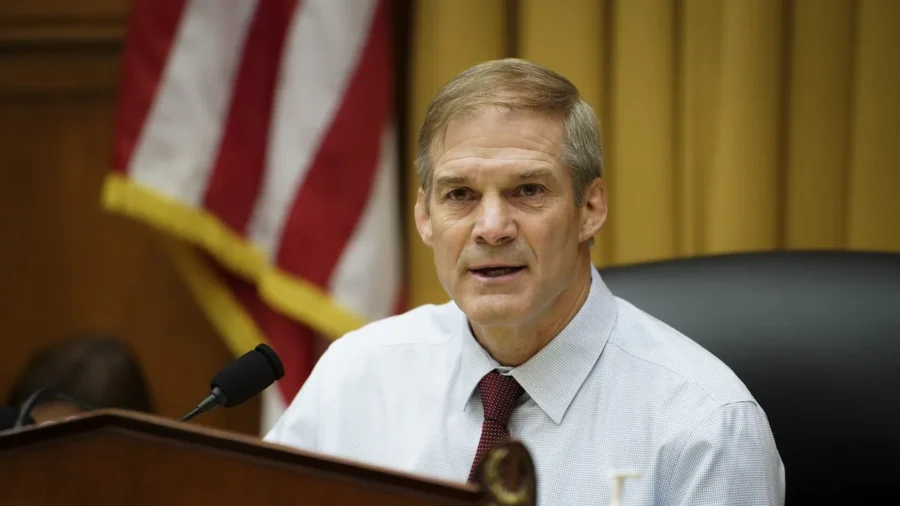House Judiciary Committee Chairman Jim Jordan (R-Ohio) is launching a new probe into how the U.S. Department of Justice handled its prosecution of an IRS contractor convicted of leaking former President Donald Trump’s tax records.
This September, the DOJ filed a criminal information letter with the U.S. District Court for Washington, alleging Charles Littlejohn gathered the tax records of thousands of wealthy U.S. citizens while working for Booz Allen-Hamilton, a company contracted with the IRS. Mr. Littlejohn immediately entered into a plea agreement in which he admitted guilt for a single count of unauthorized disclosure of tax information, and was sentenced last month to a five-year prison term, along with a $5,000 fine.
In a Thursday letter to acting Assistant Attorney General Nicole Argentieri, Mr. Jordan contends that the DOJ could have potentially charged Mr. Littlejohn for “thousands” of separate criminal acts in this case.
In a press release, Mr. Jordan called the plea agreement a “sweetheart deal.” In his letter, Mr. Jordan told Ms. Argentieri that the DOJ’s decisions in the case showed “unusual and questionable leniency towards Mr. Littlejohn” and raised his concerns that the DOJ’s decisions in the case “may be politically motivated.”
In his letter, Mr. Jordan states Mr. Littlejohn stole and leaked tax information from more than 7,600 Americans, including those of President Trump when he was the sitting U.S. president, as well as tax records for Sen. Rick Scott (R-Fla.), Tesla CEO Elon Musk, and Amazon founder Jeff Bezos.
“The scope and scale of Defendant’s unlawful disclosures appear to be unparalleled in the IRS’s history. There simply is no precedent for a case involving the disclosure of tax return and return information associated with ‘over a thousand’ individuals and entities … the human impact of Defendant’s crimes is enormous,” Mr. Jordan’s letter states, directly quoting the DOJ’s own sentencing memo against Mr. Littlejohn.
According to the DOJ’s sentencing memo, Mr. Littlejohn worked with Booz Allen-Hamilton from 2008 to 2013. The DOJ sentencing memo further states that Mr. Littlejohn sought to return to the private contractor company in 2017 “with the hope and expectation of accessing and disclosing” tax records belonging to President Trump, whom Mr. Littlejohn regarded as “dangerous and a threat to democracy.”
Mr. Littlejohn admitted, in his plea agreement, that he was aware that the IRS has safeguards in place to catch people looking for specific information and managed to flout this safeguard by using more generalized search terms to find the tax records he was seeking. Mr. Littlejohn also admitted that he knew the IRS also had methods to detect downloads of large batches of data, and knew to avoid these detection methods by instead directly uploading these selected IRS files to a website he controlled.
In his letter, Mr. Jordan notes comments U.S. District Judge Ana Reyes reportedly made during Mr. Littlejohn’s sentencing last month, in which she appeared to express concern about the leniency being shown to Mr. Littlejohn. Judge Reyes had said, “The fact that [Mr. Littlejohn] is facing one felony count, I have no words for.”
Judge Reyes, an appointee of President Joe Biden, ultimately accepted the plea agreement with the single felony count.
Mr. Jordan’s letter calls on the DOJ to provide all documents and communications between or among DOJ employees referencing or relating to the charging decisions in Mr. Littlejohn’s case, as well as all DOJ records and communications of discussions with the IRS about the charging decisions in this case. Mr. Jordan gives the DOJ until Feb. 22 to turn over the requested documents.
NTD News reached out to the DOJ for comment about this congressional inquiry but received no response by press time.
NTD News also reached out to the attorneys who had represented Mr. Littlejohn in his criminal case, but they did not respond before this article was published.

